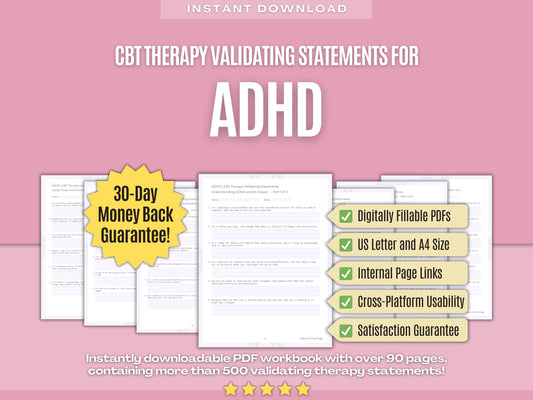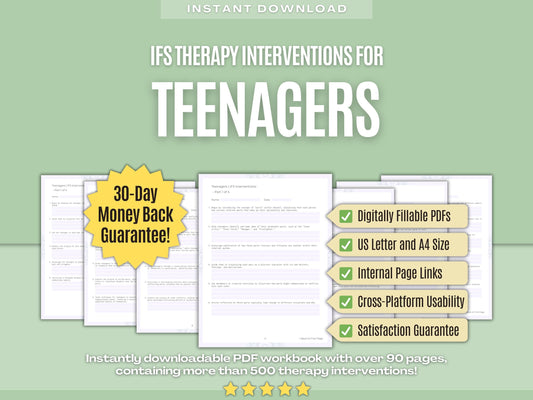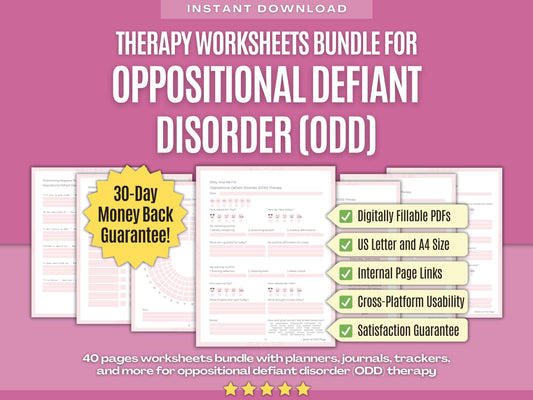Elevate Your Therapy and Guide Your Clients to Inner Healing with Our Oppositional Defiant Disorder (ODD) Therapy Interventions! ✨
1. Starting ODD Therapy
- Begin by establishing a trusting therapeutic relationship with the child, emphasizing empathy and nonjudgmental acceptance.
- Collaboratively establish therapy goals with the child and their caregivers, ensuring they are specific, measurable, achievable, relevant, and time-bound (SMART).
- Explore the child's strengths and interests as a foundation for building resilience and self-esteem.
- Introduce cognitive-behavioral techniques to help the child challenge negative thought patterns and develop more adaptive ways of thinking.
- Explore the role of family dynamics in contributing to the child's oppositional behaviors, including patterns of communication and conflict resolution.
- Foster open communication between the child and caregivers, encouraging them to express their thoughts, feelings, and concerns in a supportive environment.
- Implement behavior management techniques, such as reward systems and behavior contracts, to reinforce positive behaviors and discourage negative ones.
- Address any underlying issues contributing to the child's oppositional behaviors, such as anxiety, depression, or trauma, through individual or family therapy.
- Provide opportunities for the child to practice assertive communication skills, including expressing needs and boundaries effectively.
- Collaborate with other professionals, such as psychiatrists or pediatricians, to coordinate treatment approaches and address any medical or pharmacological needs.
- Use play therapy techniques to engage the child in therapy and facilitate emotional expression and processing.
2. Educating on ODD
- Begin by explaining the diagnostic criteria for Oppositional Defiant Disorder (ODD) according to the DSM-5, including patterns of negativistic, hostile, and defiant behaviors lasting at least six months.
- Discuss the prevalence of ODD and its potential impact on various areas of the child's life, including academic performance, peer relationships, and family dynamics.
- Explore the developmental course of ODD, including how symptoms may change over time and the risk factors for persistence into adolescence and adulthood.
- Discuss the comorbidity of ODD with other mental health disorders, such as ADHD, conduct disorder, anxiety disorders, and mood disorders.
- Provide psychoeducation on the neurobiological factors underlying ODD, including abnormalities in brain structure and function associated with emotional dysregulation and executive dysfunction.
- Teach caregivers about evidence-based parenting interventions for managing ODD behaviors, such as parent management training (PMT), behavior management techniques, and positive reinforcement strategies.
- Address the stigma associated with ODD and mental health disorders, encouraging open dialogue and advocacy for greater awareness and understanding.
- Discuss the potential long-term consequences of untreated ODD, including academic failure, social isolation, legal problems, and substance abuse.
- Explore cultural factors that may influence the presentation and perception of ODD behaviors, recognizing the importance of cultural competence in assessment and treatment.
- Discuss the importance of self-care for caregivers, emphasizing the need for support, respite, and coping strategies to maintain their own well-being.
- Foster empathy and understanding for the child with ODD, emphasizing strengths and positive qualities while addressing challenging behaviors.
3. Mindfulness Strategies for ODD
- Begin by introducing the concept of mindfulness to the child and their caregivers, explaining it as the practice of paying attention to the present moment with openness, curiosity, and acceptance.
- Teach the child and caregivers basic mindfulness techniques, such as focused breathing exercises, body scans, and sensory awareness activities.
- Encourage the child to incorporate mindfulness into their daily routine, setting aside time for practice and integrating mindfulness into everyday activities.
- Discuss the connection between mindfulness and emotional regulation, helping the child recognize how mindful awareness of thoughts, feelings, and bodily sensations can help them respond more skillfully to challenging situations.
- Incorporate mindfulness into cognitive-behavioral interventions for ODD, using mindfulness to challenge negative thought patterns and promote cognitive flexibility.
- Explore the connection between mindfulness and interpersonal relationships, helping the child cultivate empathy, compassion, and nonjudgmental acceptance of others.
- Foster a supportive and nonjudgmental environment for practicing mindfulness, encouraging the child to approach their experiences with curiosity and self-compassion.
- Explore how mindfulness can enhance the child's ability to focus and concentrate, improving academic performance and social interactions.
- Address any barriers or challenges to practicing mindfulness, such as resistance, distractions, or discomfort with certain techniques.
- Provide guidance on integrating mindfulness into daily routines and activities, such as incorporating mindfulness into transitions, meal times, or bedtime rituals.
- Explore how mindfulness can help the child develop a greater sense of agency and empowerment in managing their emotions and behaviors.
4. Dialectical Behavior Therapy (DBT) for Emotional Control
- Begin by introducing the concepts of Dialectical Behavior Therapy (DBT) to the child and their caregivers, explaining its focus on developing skills for emotional regulation, distress tolerance, mindfulness, and interpersonal effectiveness.
- Explore the connection between thoughts, emotions, and behaviors, helping the child recognize how their thoughts influence their emotional responses and subsequent actions.
- Implement emotion regulation skills training to help the child identify and label their emotions, understand the functions of different emotions, and develop strategies for managing emotional arousal effectively.
- Explore the role of mindfulness in emotional regulation, helping the child cultivate nonjudgmental acceptance of their emotions and learn to respond to them with greater flexibility and resilience.
- Provide psychoeducation to caregivers about the principles and techniques of DBT, including the importance of validation, dialectics, and balancing acceptance with change.
- Use role-playing and behavioral rehearsal to practice new skills and strategies for managing emotions and interpersonal interactions, providing guidance and reinforcement for progress.
- Address any barriers or challenges to practicing DBT skills, such as resistance, avoidance, or difficulty generalizing skills to real-life situations, through problem-solving and motivation enhancement techniques.
- Explore the function or purpose of the child's emotional dysregulation, helping them understand the underlying motives or triggers for their intense emotions and maladaptive coping strategies.
- Collaborate with the child's school or other relevant professionals to reinforce DBT skills training and provide support for generalization and maintenance of skills across different settings.
- Provide validation and empathy for the child's experiences of emotional distress, recognizing the challenges of living with intense emotions and validating their efforts to change and grow.
- Explore the impact of past experiences and relational patterns on the child's emotional regulation difficulties, providing opportunities for processing and healing through individual or family therapy.
5. Interpersonal Therapy (IPT) for Social Skills
- Begin by introducing the concept of Interpersonal Therapy (IPT) and its focus on improving social skills and relationships.
- Teach active listening skills, emphasizing the importance of paying attention to others' verbal and nonverbal cues.
- Explore the individual's social support network and identify opportunities for strengthening existing relationships or forming new ones.
- Teach relaxation techniques to help manage anxiety or stress related to social interactions.
- Use behavioral experiments to test out new social skills in real-life situations and provide feedback and support.
- Help the individual develop strategies for coping with rejection or criticism in social situations.
- Explore the individual's interests and hobbies as potential avenues for connecting with others who share similar interests.
- Encourage the individual to practice self-care and prioritize activities that bring them joy and fulfillment outside of social interactions.
- Explore the individual's cultural background and how it may influence their social interactions and communication style.
- Discuss the impact of ODD symptoms on social relationships and brainstorm ways to manage these symptoms more effectively in social settings.
- Explore the role of family dynamics in the individual's social development and identify ways to improve communication and support within the family system.
6. Emotion-Focused Therapy (EFT) for Emotional Awareness
- Introduce the concept of Emotion-Focused Therapy (EFT) and its emphasis on increasing emotional awareness and regulation.
- Explore the individual's emotional triggers, helping them recognize patterns and situations that tend to evoke strong emotional reactions.
- Encourage the individual to express their emotions in a safe and supportive environment, validating their experiences without judgment.
- Use emotion-focused imagery exercises to help the individual access and process deeper emotions that may be difficult to verbalize.
- Explore the individual's early experiences with emotions, including how emotions were expressed and received within their family of origin.
- Use art therapy or expressive techniques to help the individual externalize and explore their emotions in a creative and nonverbal way.
- Explore the concept of emotional schemas or core beliefs about emotions, helping the individual identify and challenge any negative or unhelpful beliefs.
- Discuss the importance of empathy and perspective-taking in understanding others' emotions and building healthier relationships.
- Help the individual develop a personalized emotion regulation toolkit, including strategies they can use to cope with intense emotions in various situations.
- Explore the individual's attachment style and how it may influence their patterns of emotional expression and regulation.
- Discuss the role of self-care in emotional well-being, including the importance of setting boundaries, prioritizing rest and relaxation, and engaging in activities that bring joy and fulfillment.
7. Psychodynamic Approaches to Underlying Issues
- Introduce the concept of psychodynamic approaches to therapy and their focus on exploring underlying unconscious conflicts and patterns.
- Use free association techniques to help the individual access unconscious thoughts and emotions, encouraging them to speak freely without censorship.
- Discuss the role of attachment theory in understanding the individual's patterns of relating to others, exploring how early attachment experiences may influence their current relationships.
- Help the individual identify recurring themes or patterns in their thoughts, feelings, and behaviors, linking these patterns to underlying unconscious conflicts.
- Use dream analysis to explore the symbolic meaning of the individual's dreams and uncover unconscious themes or conflicts.
- Explore the individual's relationship with authority figures, such as parents or teachers, and how these relationships may influence their behavior and attitudes towards authority.
- Explore the individual's sense of identity and self-concept, including any internalized beliefs or messages they have received from caregivers or society.
- Discuss the role of unconscious fantasies and wishes in shaping the individual's behavior and relationships.
- Explore the concept of the "internal saboteur" or critical inner voice, helping the individual recognize and challenge self-defeating thoughts and beliefs.
- Encourage the individual to explore their fantasies and daydreams, looking for clues about unconscious desires or conflicts.
- Help the individual explore their relationship with aggression and anger, looking for underlying emotions such as fear or hurt.
8. Music Therapy for Emotional Regulation
- Introduce the concept of music therapy and its potential for promoting emotional regulation and self-expression in individuals with Oppositional Defiant Disorder (ODD).
- Encourage the individual to explore different musical styles and genres, inviting them to listen to and experiment with a wide range of music that elicits different emotional responses.
- Provide structured music therapy exercises, such as guided imagery with music or progressive relaxation exercises, to help the individual relax and regulate their emotions.
- Use songwriting as a means of self-expression and emotional processing, encouraging the individual to write lyrics or compose melodies that reflect their thoughts and feelings.
- Encourage the individual to create playlists of music that helps them feel calm, energized, or happy, providing them with a personalized tool for emotional regulation.
- Provide opportunities for the individual to perform or share their musical creations with others, fostering a sense of connection and community.
- Use music therapy as a tool for processing trauma or grief, allowing the individual to express and release difficult emotions through music.
- Use guided imagery or visualization exercises with music to help the individual create mental images or scenes that promote relaxation and emotional well-being.
- Use music therapy as a means of promoting social skills and communication, such as group drumming exercises or collaborative songwriting activities.
- Use music therapy to facilitate emotional expression in individuals who may have difficulty verbalizing their feelings, providing them with a nonverbal outlet for communication.
- Use music therapy to facilitate emotional release and catharsis, allowing the individual to express and process intense emotions in a safe and supportive environment.
9. Wrapping Up Therapy Sessions
- Review the key topics and themes discussed during the therapy session, summarizing the individual's progress and insights.
- Discuss any homework assignments or goals set during the session, checking in on the individual's progress and addressing any challenges or barriers they may have encountered.
- Provide feedback and reinforcement for the individual's strengths and coping strategies, highlighting areas of growth and resilience.
- Collaboratively problem-solve any remaining challenges or concerns the individual may have, brainstorming practical strategies and solutions.
- Explore the individual's feelings about ending therapy, acknowledging any ambivalence or anxiety they may have about concluding the therapeutic relationship.
- Discuss the importance of maintaining self-care practices and coping skills after therapy ends, reminding the individual of the tools and strategies they have learned.
- Review any relapse prevention strategies or coping plans developed during therapy, ensuring the individual feels prepared to manage challenges on their own.
- Offer reassurance that the therapeutic relationship does not end abruptly and that the individual can reach out for support if they ever need it in the future.
- Explore the individual's goals and aspirations for the future, helping them envision a positive trajectory for their life beyond therapy.
- Provide closure by expressing gratitude for the individual's participation in therapy and the opportunity to work together towards their goals.
- Offer a final check-in on the individual's emotional state and well-being, ensuring they feel supported and validated as they prepare to transition out of therapy.
10. Concluding the Therapeutic Journey
- Reflect on the individual's progress and growth throughout the therapeutic journey, acknowledging the challenges they have overcome and the changes they have made.
- Discuss the goals that were set at the beginning of therapy and reflect on the progress made towards achieving those goals, celebrating the individual's achievements and successes.
- Validate the individual's feelings about concluding therapy, acknowledging any sadness or anxiety they may feel about ending the therapeutic relationship.
- Review the coping skills and strategies the individual has learned in therapy, ensuring they feel equipped to manage challenges on their own moving forward.
- Offer reassurance that the therapeutic relationship does not end abruptly and that the individual can reach out for support if they ever need it in the future.
- Discuss potential signs of regression or setbacks and create a plan for how the individual can seek support if needed in the future.
- Celebrate the individual's resilience and growth throughout the therapeutic journey, highlighting their strengths and accomplishments.
- Discuss any final thoughts or reflections the individual may have about their therapy journey, allowing them to express any remaining thoughts or concerns.
- End the therapeutic relationship with a sense of closure and completion, reaffirming the individual's agency and autonomy in their journey towards health and well-being.
- Express confidence in the individual's ability to navigate life's challenges and thrive beyond therapy, affirming their resilience and capacity for positive change.
- Encourage the individual to reflect on their progress and growth periodically after therapy ends, helping them recognize and celebrate their continued accomplishments.
We hope that our therapy interventions for Oppositional Defiant Disorder (ODD) therapy will help you to elevate your therapy practice and guide your clients to inner healing! Do you need more therapy interventions for Oppositional Defiant Disorder (ODD) therapy? Find them all in our Digital Workbook! Or do you have any questions or suggestions for us? Please feel free to contact us at any time!


















